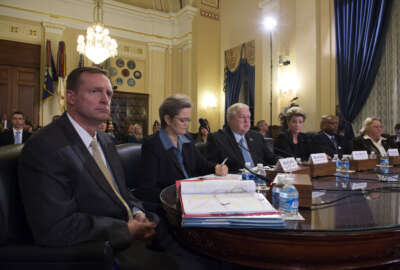Powerful Republicans and Democrats in Congress say they want to pass legislation to let Veterans Affairs Secretary Bob McDonald discipline or fire employees more quickly — a measure that could pave the way for similar changes across the federal government.
Rep. Jeff Miller (R-Fla.), the chairman of the House Veterans Affairs Committee and a sponsor of the legislation, said he thought lawmakers would arrive at a compromise that preserved VA employees’ rights to appeal such decisions, while shortening the appeals process.
“Where I come from, when you’re fired, you’re fired. You walk out the door that day,” he said Nov. 5 at the Brookings Institute. “What you hear from VA is, ‘we’ve given notice.’ To me, that’s not firing somebody.”
Miller said that the lack of accountability within the VA was the biggest problem facing the department as it tries to recover from a scandal in which multiple health centers fudged their appointment logs to make it look like patients were getting timely care. While the department is overhauling its health care delivery system so that it can better treat patients, Miller said it had yet to address the behavior that led to the scandal in the first place. To date, the VA has fired three employees for the scheduling problems, he said. (Others have resigned, retired or been fired for other reasons.)
“We still have to try to root out some of the culture that is in the VA that is more about taking care of the bureaucrat than taking care of the veteran,” he said. “Until that is done, I don’t think VA will be operating on all eight cylinders.”
Miller spoke just two days after leading a Congressional hearing at which a top Veterans Benefits Administration official said rules meant to protect the civil service had made it hard to fire two executives who — according to a VA Office of Inspector General report — pressured others to give them their jobs, then used VA money to pay for their own relocation. Speaking generally, Principal Deputy Under Secretary for Benefits Danny Pummill said employees often resigned or retired before they could be fired.
The House passed the legislation in July. Sen. Richard Blumenthal (D-Conn.), the top Democrat on the Senate Veterans Affairs Committee, has blocked a similar bill from coming to the floor of the Senate. But a spokesman for Blumenthal said the senator opposed Republicans’ efforts to pass the bill without amendments or debate, not the sentiment behind the bill. He said Blumenthal wanted to find a compromise that prevented VA officials from using the new authority against whistleblowers.
Miller said he looked forward to working with Blumenthal.
“I’m pretty stubborn, but not stubborn enough to hold up a good accountability piece, even if it’s not 100 percent of what I wanted,” he said.
Rep. Tim Walz (D-Minn.), a member of the House Veterans Affairs Committee, said he also wanted VA to increase accountability, but he worried about the “second- and third-degree effects” of legislation. The VA already has tools to get rid of bad actors but administrators don’t use them, he said.
“People need to be fired, but I would make the case that Mr. Pummill could have done his job better and not given bonuses to an underperforming employee and move them somewhere else under the guise that he couldn’t do anything about it. I certainly think he could have. That’s maybe where we differ,” said Walz, who also spoke at Brookings.
But the overall purpose of the legislation was sound, Walz said, and should not be taken as an attempt to weaken labor unions within the federal government, “although it will be characterized that way.”
Anything that would help improve services for veterans should be considered, he said.
“I don’t have an ideological dog that I’m tied to in this fight. What I care about is that outcome,” he said. “You heard it here: I’m certainly willing to compromise where it needs to be to make it happen.”
Veterans Affairs leaders are wary
The White House said President Barack Obama would veto the legislation out of concern for VA employees’ due process rights. It also criticized the measure for creating a disparity between VA employees and other federal workers. VA leaders say they do not need another law. On the contrary, they say, it could stifle dissent and innovation within the department.
Miller said he took that as an indication that the department was following the White House’s lead.
If some form of the legislation becomes law, he said he hoped it would serve as the test case for the rest of government.
“This is not just at the Department of Veterans Affairs. Throughout the federal government, there are issues out there,” he said.
When pressed by an audience member, Miller said he would support broader civil service reforms.
“Times they are a-changin’. The American public wants accountability,” he said.
Copyright
© 2024 Federal News Network. All rights reserved. This website is not intended for users located within the European Economic Area.
